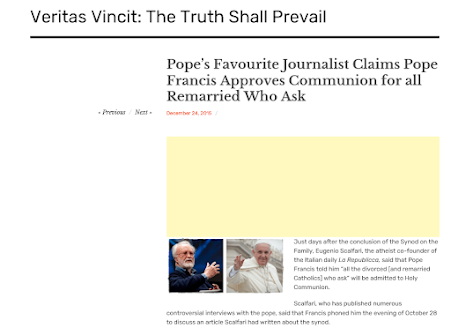VATICAN CITY (CNS) — The beauty of faith comes from opening one’s heart to love and not fixating on following rules and regulations, (the apostate) Pope Francis said.
Similarly, the desire to receive the grace of the Holy Spirit, especially in the sacraments, “cannot be suffocated by a bureaucracy that prevents access to the grace of the Spirit, the initiator of conversion of heart,” the pope said Oct. 27 during his weekly general audience.
“How many times we ourselves, priests or bishops, create so much bureaucracy to give a sacrament, to welcome people, that people say: ‘No, I do not like this,’ and they leave, and often they do not see in us the power of the Spirit who regenerates, who makes us new,” he said
....
The (apostate) pope said St. Paul reminded the Galatians that the death and resurrection of Christ should be at the center of one’s faith and warned against the temptation of basing “their religiosity on the observance of precepts and traditions.”
He also noted that the same temptation exists today, and “there are many who still seek religious security” by focusing on “rituals and precepts instead of embracing God’s love with their whole being.”
...
“No this is not the Church!” (The Apostate) Pope Francis said. To reduce faith to just following “commandments or a moral vision” can “make us forget the original fruitfulness of love nourished by prayer from which peace and joyful witness flow.”
Leonardo Boff: "Pope Francis is much more liberal than what is supposed."
"A couple of months ago, for instance, he expressly approved that a homosexual couple adopt a child. He is in touch with priests who have been repudiated by the official church because they got married."

 |
| Eugenio Scalfari, the atheist co-founder of the Italian daily La Republicca, said that Pope Francis told him “all the divorced [and remarried Catholics] who ask” will be admitted to Holy Communion. |
Whoever publicly asserts that one may receive communion in mortal sin is excommunicated
If anyone says that faith alone is sufficient preparation for receiving the sacrament of the most Holy Eucharist: let him be anathema. And that so great a Sacrament may not be unworthily received, and therefore unto death and condemnation, this holy Council ordains and declares that sacramental confession must necessarily be made beforehand by those whose conscience is burdened by mortal sin, however contrite they may consider themselves. If anyone moreover teaches the contrary or preaches or obstinately asserts, or even publicly by disputation shall presume to defend the contrary, by that fact itself he is excommunicated. (Denzinger-Hünermann 1661. Julius III, Council of Trent, Session XIV, October 11, 1551)












No comments:
Post a Comment
Note: Only a member of this blog may post a comment.